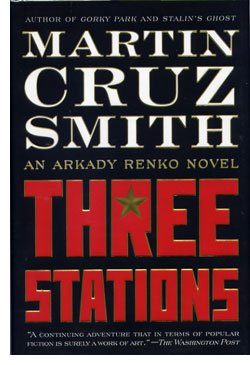 |
 |
 Martin Cruz Smith
Martin Cruz Smith
Three Stations
Reviewed by: Rick Kleffel © 2010
Simon & Schuster
USA Trade Hardcover, First Edition
ISBN 978-0-743-27674-0
Publication Date: 08-17-2010
256 pages, $25.99
Date Reviewed: 10-04-2010
Index:
Mystery
General Fiction
William Gibson famously suggested that the future has arrived, but that it isn't distributed evenly. This is often taken to suggest that those high-tech-pockets of America where the surfaces gleam and the depths are digitally enhanced will be eventually be replicated from sea to shining sea. But there's ample evidence that this is an upside-down vision. Those isles of the wired may instead belong to a past that never quite comes to fruition. For the future, for, at least, our future, we may have to look elsewhere.
With the American empire in decline, our future may be present outside of America. Russia, itself once a leader in technology, of not societal innovation, may be just the present where the American future is to be found. Martin Cruz Smith has spent the last 37 years visiting and writing about Russia; he began his first Arkday Renko detective novel, 'Gorky Park,' in 1973. The latest Arkday Renko novel is 'Three Stations,' a compelling and surreal vision of the sort of chaos towards which the American empire is lurching. It may not be a pretty picture of our future, but it is a joy to read.
'Three Stations' begins with the loss of a child. Maya is a fifteen year-old girl riding "hard class" on a train bound for the Three Stations platforms in Moscow. She chooses an empty compartment but is soon joined by visitors welcome and unwelcome. Stupendously tired, she falls asleep, only to awaken without her child. Arkady Renko, called to help his friend Victor Orlov out of the "sobriety station" (read: drunk tank), joins Orlov at the scene of what may be a crime. A young woman, who looks to be a prostitute, has been found dead in one of the many parts of Three Stations. Renko suspects a crime has indeed been committed, but his superiors disagree. He pursues the case in spite of their escalating threats.
Smith's novel is sparse and intense. He's an expert at creating vivid and memorable characters with a few deft strokes. That's all for the best, because there's a large cast in 'Three Stations,' and lots of threads to follow. In fact the whole world seems to be coming unraveled around Arkday, Maya, and everyone else. So much is happening so quickly that crime and the worst intentions tend to prevail. Everything is broken, battered, and running on empty. Money is not quite meaningless, not yet, but it's getting there. Orlov, Renko, Maya, Renko's teenaged protégé, Zhenko, and a cast of criminals that are positively Dickensian are vividly portrayed. No matter who you are with in 'Three Stations,' it's a compelling perspective.
Of course, this is due to Smith's ability to orchestrate chaos and create surreal beauty. His writing is superb. The descriptions of places and people are vivid, but never overdone. He has a great sense for conveying a complicated scene of action, putting us in settings of peril with propulsive prose and gut-wrenching emotion. Russia, right now, this moment, is reeling from a series of economic blow that have created an income gulf; on one side are the penniless and dirt poor, and looking across the abyss are the once-wealthy and once-powerful whose money is vanishing. The rich are no longer safe in Smith's vision of Russia. All that separates then from the peasantry is a veneer that is rapidly eroding. Those parts of the country that are not already hellish are collapsing downwards, ever downwards.
Smith's sense of plot is loose and frightening. He creates an ambience where it seems that anything can happen at any time, no matter how unreasonable. He renders this despair engagingly bearable with characters we really care about, and a bleak but very funny sense of humor. Amidst death, squalor and a willful blindness to reality, Smith finds wit and humanity. He genuinely likes all his characters, even those who are not so gentle.
Though 'Three Stations' is set in a rigorously realistic though surreally-rendered version of Russia, no western reader can experience this novel without more than a tinge of fear. 'Three Stations' depicts a world that has lost its moorings. Panic and a sense of savage self-preservation seem to be an utterly reasonable response to the world of 'Three Stations' and any moment of humanity, of giving, seems positively heroic. Our most hopeful response to Smith's vision is "There but for the grace of God, go we." But in the back of our minds, that sentiment is uneasily revised to, "There but for about three more years of this, go we." Our future may have already arrived. It will catch up with us, and the chances are we won't even know that it has happened until we look back on a happier, saner past — a past that is the world as we know it now, this minute. Enjoy reading 'Three Stations.' When we arrive there, the books we have to read may not be so agreeable.
|
 |
|
|
 |
| |
Review Archive
All Reviews alphabetized by author.
General Fiction
Non-Genre, general fiction and literature.
Horror
Supernatural fiction, supernatural horror and non-supernatural horror.
Science Fiction
Science fiction, science fantasy, speculative fiction, alternate history.
Fantasy
Fantasy, surrealism and magic realism.
Mystery
Crime, thrillers, mystery, suspense.
Non-Fiction
Non-Fiction, True Crime, Forteana, Reference.
Poetry
|
|
 |
|




